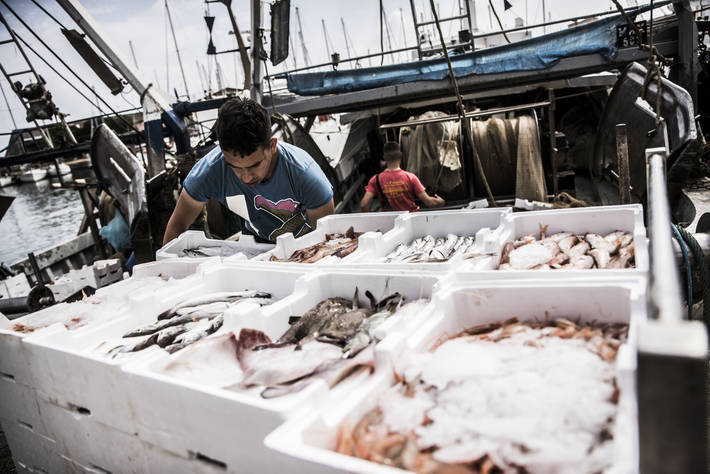Rome – After decades of increasing human pressures on the Mediterranean and Black Sea marine ecosystems and fisheries resources, the latest data suggest that a corner is finally being turned on overexploitation of the region’s vital fish stocks.
According to a new report on the State of Mediterranean and Black Sea Fisheries(SoMFi 2020), released today, while 75 percent of fish stocks remain subject to overfishing, this percentage fell by more than 10 percent between 2014 and 2018. Exploitation ratios are down by a similar proportion. Taking into account newly assessed stocks, the number of fish stocks with high relative biomass has doubled since the last edition published in 2018.
The SoMFI report is published biennially by the General Fisheries Commission for the Mediterranean (GFCM) – a FAO statutory body which operates under FAO Governing Bodies. The report has been produced by FAO staff within the GFCM Secretariat with the collaboration of select experts and on the basis of the data sent by fisheries administrations along the Mediterranean and Black Sea as well as the analysis carried out by the technical statutory bodies of the GFCM.
While most of the stocks remain overexploited, this is the first time in decades that the GFCM has been able to report some positive trends.
Important examples of improvement amongst priority stocks include European hake, which is displaying signs of recovery in the Mediterranean, and Black Sea turbot, which has seen a decline in its exploitation ratio as its spawning stock biomass has continued to rebuild over the past four years.
“Thanks to the commitment of GFCM members and experts to addressing existing challenges, for the first time we can say that some positive signals are finally emerging in the sector” said Abdellah Srour, GFCM Executive Secretary. “While we know there is a lot more work still to be done before the region’s fisheries are on a sustainable footing, we are pleased that we have begun to reverse some of the most worrying trends.”
“Sustainable management does not just benefit the fish stocks”, said Islem Ben Ayed, President of the Tunisian Association for the Development of Artisanal Fisheries. “The sustainability of Mediterranean and Black Sea fisheries means sustaining jobs, ensuring healthy food and maintaining cultural heritage in our coastal communities for generations to come.”
A positive shift towards sustainable fisheries
Last November, ministers from the region reiterated their political commitment to achieving the objectives of the MedFish4Ever and Sofia Declaration to pursue an even higher level of ambition within the future GFCM Strategy (2021-2025) and to contribute to the achievement of Sustainable Development Goal 14.
Some notable successes have been achieved now that national and regional management measures have had time to take effect. Ten multiannual fisheries management plans are now in place, involving more than 4 000 fishing vessels.
Socio-economic impacts of fisheries in the region
The report reveals the considerable extent to which Mediterranean and Black Sea fisheries contribute to regional economies by generating direct revenues, driving wider spending, and providing crucial jobs. The overall annual economic value of fisheries in the region is estimated at $9.4 billion.
Mediterranean and Black Sea fisheries provide 225 000 onboard jobs and are estimated to contribute livelihoods to a total of 785 000 people. In parts of some countries including Tunisia, Croatia, and Morocco, close to one in every 100 coastal residents is a fisher.
While small-scale fisheries make up most of the industry representing the overwhelming majority of fishing vessels (83 percent) and fishing-based jobs (57 percent) in the region, their share of the region’s total catch is only 15 percent.
Small-scale fishers generate less than 30 percent of total fisheries revenue, have uncertain livelihoods, and are most vulnerable to unforeseen problems or crises such as the COVID-19 pandemic. They need more state support and a stronger social protection framework including access to unemployment insurance, the report says.
The report also offers valuable insights into the state of current workforce in fisheries in the region. The sector is rapidly aging: almost half of workers are over 40 and only 17 percent are under 25 – a situation requiring proactive measures in order to ensure that a skilled workforce remains available.
In addition, the report highlights that building the resilience of fisheries will be evermore critical in the face of increasing pressure on the marine environment from climate change and human activities. The new publication serves as a valuable tool to guide action towards the sustainable future.
About GFCM
GFCM is a regional fisheries management organization operating under the framework of FAO, whose competence extends over all marine waters of the Mediterranean and the Black Sea. Its main objective is to ensure the conservation and the sustainable use of living marine resources, as well as the sustainable development of aquaculture.
GFCM Members include 23 contracting parties (Albania, Algeria, Bulgaria, Croatia, Cyprus, Egypt, European Union, France, Greece, Israel, Italy, Lebanon, Libya, Malta, Monaco, Montenegro, Morocco, Romania, Slovenia, Spain, Syria, Tunisia, Turkey) and five cooperating non-contracting parties (Bosnia and Herzegovina, Georgia, Jordan, Moldova, Ukraine).
Source: FAO News


Comments